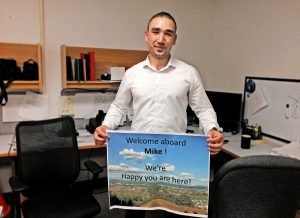 A poster of blue skies above Kent lay across Meqdam “Mike” Almaroof’s desk on his first day of work with the city. He can recall the exact date — Aug. 15, 2016 — from memory and still has the poster that welcomed him to the team and exclaimed, “We’re happy you are here!”
A poster of blue skies above Kent lay across Meqdam “Mike” Almaroof’s desk on his first day of work with the city. He can recall the exact date — Aug. 15, 2016 — from memory and still has the poster that welcomed him to the team and exclaimed, “We’re happy you are here!”
Almaroof was happy to be there, too. So much so, he kept the welcome poster as a reminder and keepsake. “It meant a lot…it means a lot to me,” he said.
The job was one giant step on the long, difficult path to establish his professional career in America after resettling in Washington state in 2015, with the help of Jewish Family Service.
Almaroof had been an engineer in his home country of Iraq. After earning his bachelor’s degree from Baghdad’s University of Technology, he had a successful 10-year career that included constructing bases with the U.S. military from 2003 until 2010. When the U.S. began to draw down its forces, Almaroof became a target, and like many others who had worked with the U.S., his life was now at risk.
Almaroof had professional skills compatible with the American market, but resuming his career where it left off was not going to be easy. In addition to licensing and certification barriers, he had minimal English language skills, no job contacts and gaps in understanding cultural and professional norms.
“It’s never been easy,” Almaroof said. “When you get to America, it’s really hard to get a job that uses your past experience.”
FINDING A FIRST JOB
Like all refugees, Almaroof needed to start working immediately so he could pay for rent and other necessities. He was grateful to have the income his Tukwila security guard job paid, but Almaroof didn’t want to give up on using his professional skills. So he began pounding the pavement — literally. He walked the streets of Seattle, handing out his resume from Iraq to any contracting or engineering companies he could find.
Almaroof was a prime candidate for Tatweer, the JFS mentorship program for refugees with specialized skills and experience. In addition to general coaching, Tatweer matches clients with mentors who are established professionals in their desired fields.
JFS helped Almaroof update his resume to meet American job market standards. Style changes were made, like removing the headshot customary on resumes in Iraq. Adding project details to conform to American engineering norms was another adjustment. Perhaps most importantly, Almaroof learned to apply for jobs online, something he did not know to do when he was searching on his own.
JFS and the Tatweer engineering mentor helped Almaroof understand general employment practices and coached him on how to communicate with recruiters. This was critical once JFS connected Almaroof with Johnetta Rowsey, a recruiter with the city of Kent.
Kent had long been a valued partner in JFS resettlement work and the city council had recently announced its vision for a culturally vibrant city government that embraced inclusion and diversity among its staff. The goal was to have a representative government that looked like the populations it served.
Rowsey encouraged JFS to submit clients’ resumes, including Almaroof’s, so qualified candidates could be considered by city departments. Rowsey and her colleagues were impressed with the applicants. “It was just like a gold mine was sent to us,” Rowsey said.
That gold mine became the payoff for Almaroof when he was offered an engineering job with the city of Kent.
GETTING TO WORK
Almaroof’s first major project was surveying about 100 sidewalk ramps and drawing retrofit designs to make them ADA accessible for people with wheelchairs, visual impairments or other disabilities. In April, he presented his design plans to the city’s Public Works Committee. The plans have since been approved and construction is set to begin.
According to Almaroof’s supervisor, Joseph Araucto, the city had not previously undertaken a sidewalk and street accessibility project with the depth of detail and surveying Almaroof provided. His work created a guide and procedure that will be used in future projects, including the one he is leading to evaluate 1,200 more curbs.
In addition to his hard skills, Almaroof has been an exemplary employee. He is easy to collaborate with and is motivated, often showing up to work before his boss, Araucto added with a laugh. Almaroof was “exactly what we were looking for,” Araucto said.
PERSISTING ON THE PATH
“I don’t give up easily,” Almaroof repeated just as often as he noted, “It’s never been easy.”
The persistence he showed in his search is just as evident now that he has his first American engineering job. Almaroof continues to work on everything from the basics of professional communication to the software experience that can advance his career.
While Almaroof’s engineering degree from Iraq won’t allow him to begin exams for a Washington state license right away, he plans to work under a professional engineer with the city of Kent for a year until he is eligible to take the first exam in the licensing process. He will need an additional five years of professional experience before he can take the final exam for his state license.
“It was a big step for me when I got this job. I tried so hard,” Almaroof said. “This job put me on a path…the right path.”
 By Rachel Anne Seymour
By Rachel Anne Seymour
Rachel is a trail-running dog owner and the Marketing and Communication Coordinator for JFS. She has previously worked as a multimedia journalist for newspapers throughout the Midwest and Western Washington.



